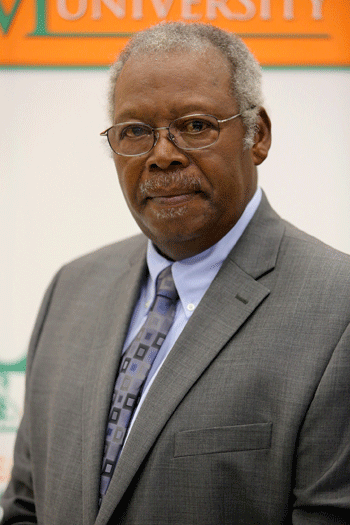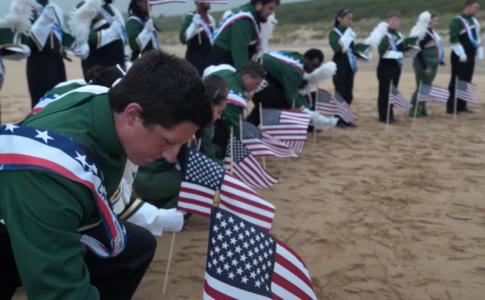Less than two years after Florida A&M’s hazing incident and disbanding of the Marching 100, a new band director—Dr. Sylvester Young—steps in to make changes and get the group back on the field.
The death of drum major Robert D. Champion, Jr., from the Florida Agricultural and Mechanical University (FAMU) Marching Band in Tallahassee, Fla., stunned the world in November 2011. After a one-and-a-half-year ban, university changes, the retirement of the band director and resignation of the university president, and ongoing court battles regarding the alleged hazing death, the Marching 100 has hired a new band director and been unbanned from campus.
A FAMU band alum himself, Dr. Sylvester Young has worked as director of bands at Hampton (Va.) University, Lincoln University in Jefferson City, Mo., and Ohio University in Athens. He is now coming out of retirement to serve his alma mater. Can he eliminate hazing and get the band back on track for public performances?
Halftime: Why did you decide to come out of retirement for this job?
Young: I think they had a search before, and I had no serious intentions. I did follow the interaction between the parents— my heart just went out to those people— and so I just assumed that FAMU had resolved it by hiring a new band director. But then that search did not prove as successful as they had liked, and that’s when I started getting calls from my friends. I looked into it and discussed it with my family, and we made a decision. I felt very strongly that my experiences could help bring some type of leadership and guidance in this whole process.
Halftime: How do you personally define hazing?
Young: Hazing is sort of a culture thing within an organization, and I’ve found that to be true at all of the universities. And in some way, it’s very subtle and unthreatening. Usually the students will define it as “tradition,” things that are handed down to them, and they’re passing it on, and this is the way it is—and that’s not the truth. I think it’s not right whenever you impose any type of information or have a kid do something that’s not within the policies of that program and then, for sure, not within the goodwill of that particular student. That just should not exist.
Halftime: Did you ever have to deal with hazing at your previous jobs?
Young: I dealt with it before; I would just stop it in its tracks. Band is about music first and then about marching and combining the two to present entertainment for the public. In any situation you must always be referring back to the main reason that the band exists and where it comes from, why we’re here. In addition to that, you need to constantly keep the students focused on why they’re here at the university. You usually have at least 60% to 80% non-music majors participating, which means only 20% of the students are in that class to get their degree, which means you have all of these other students that are not focused enough on the real reason they’re there. Of course you want them to do the best they can in the band program, but you still don’t want them to lose sight of the real reason they’re at that university, which is to get a degree and move on with their lives.
Halftime: Did you deal with hazing when you were a member of the band?
Young: It was not called hazing, and we didn’t classify it as hazing, just things that we felt were part of the culture of the band. I felt that I was a really, really fine musician, of course—but we just did those things as part of the program. Once I became an upperclassman and recognized the things that were not necessary to participate in the program, I of course pushed my weight around and in turn my colleagues to be against those types of activities.
Halftime: Any physical violence?
Young: No physical stuff. Mostly mental and other things. One example was we’d travel, and an upperclassman would get a freshman to share a room and then kick the freshman out of the room and bring in a girlfriend or something. I just can’t remember any physical activities that came to my attention when I was a part of the band program as a student.
Halftime: What is your plan for bringing back the band? While the university president lifted the ban, he has said it’s up to you to decide when the band can perform again.
Young: From this point it’s strictly a stepby- step process. They went a year without having a freshman class, and a band of that size counts on a freshman class to fill the open positions—well over 100 students are lost from the band. We have to screen the new incoming class, and we can only get those students that are by chance coming to FAMU and meet all of the qualifications since no students were specifically recruited this year. Then we have to go back and screen students who were in the band before. If you were a freshman when this happened, you are now coming back as a junior. The seniors may now be more involved with their degree programs and other things and may not even have time; we don’t know. Once all of these things fall in place, then we can possibly focus on a time to bring the band back. It’s a very busy time for us. We’re just happy the suspension has been lifted, which frees us up to move to the next step.
Halftime: Do you anticipate that the band won’t be performing at football games this upcoming fall season?
Young: I don’t want to say that, but we just don’t know. As every week goes by, we’ll know more. What I’m trying to get out to the press and public is that we’re actively involved in a very strict and controlled process of bringing the band back, and we don’t want to violate or miscalculate any aspect of this process.
Halftime: How will you change the band culture and eliminate hazing?
Young: The university’s new strict system of dealing with hazing is now outside of the band, so any activities that can be identified as happening within the band will be dealt with right away. But on the band side, we’re the ones on staff who have day-by-day interaction with the students. And we plan to get to know each student, one student at a time, become a partner and mentor to the students, remind them of their reason to be here. What are you representing? The university, your community, your family, and it goes all the way through; we want to make them understand that. Then at the same time, we hope to introduce other social activities for the kids that will be social and fulfilling and be unthreatening to each other as fellow colleagues within the band.
Halftime: How will you change the public’s perception of the band?
Young: I think in time the public will see a different collective personality of this band and at the same time see a higher level of performance skills. We are challenging everything related to the student’s participation and demanding that they are the best students on campus with the highest quality of character and all of those things. In time the public will see that.
Halftime: What is your message to band alumni or others that want to preserve the band as it was?
Young: I’m pretty sure we can’t please everybody, and this band has produced a lot of alumni, and their perception of the band is based on their time in the band. There will be some changes, but the standard will not change; they will be increased. I hope that alumni will track us and see that all the changes that were made are to make the band better and have a better presentation. We will not take one step backwards. If they felt that the band was the best it had ever been when they were there, then we want these kids in the band currently to feel the exact same thing. It’s a different time, a different era, but we will not compromise the standards the band has set for itself.


